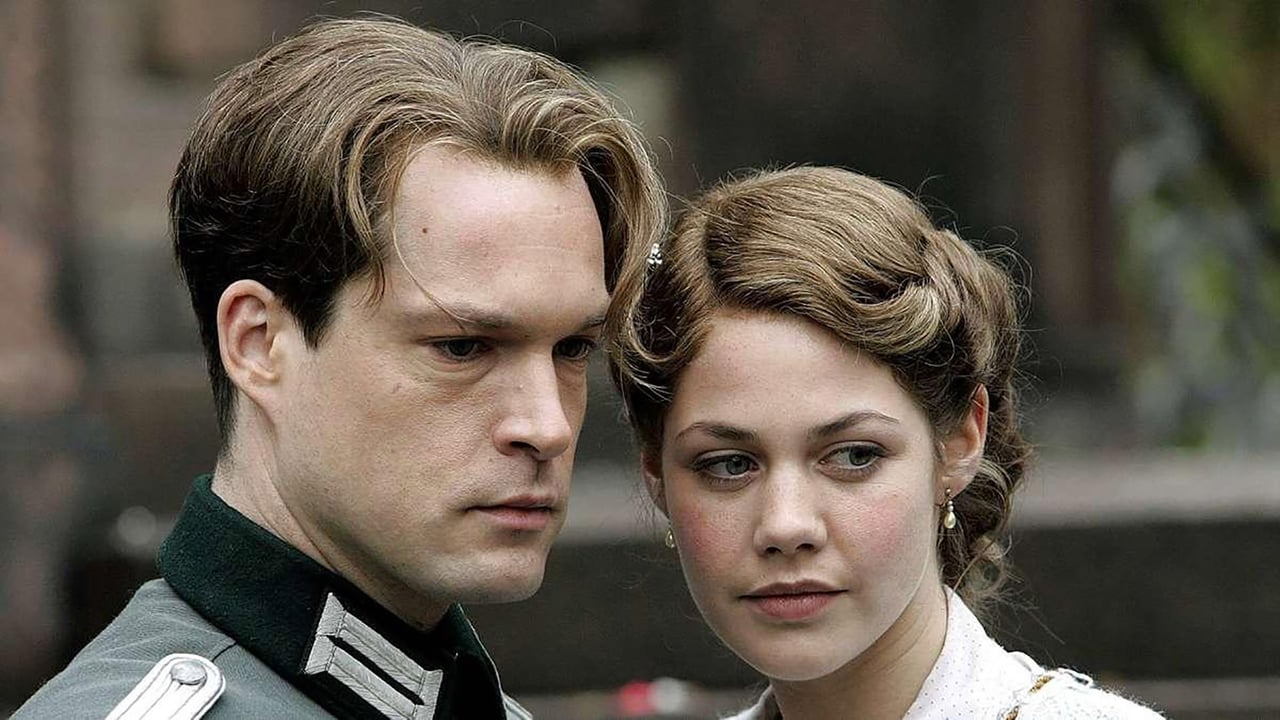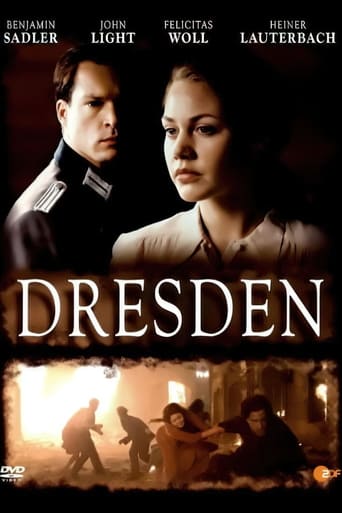

The central figure in this series is Felicitas Woll, a young nurse in a Dresden hospital who secretly helps a wounded British pilot, John Light, out of simple decency and then falls in love with him, despite her imminent marriage to a rather stiff doctor. It's all about her. And she carries it off nicely, cheerfully for the most part. If at first she looks a little chubby, after a few minutes of exposure she comes to resemble Meg Ryan with her gay smile. She has the most engaging nose too. Unremarkable except at its tip where its ordinary slope forms an impudent lump.It's a lengthy miniseries mostly in German with English subtitles. I wish more Americans were able to see this because it's intelligent, and many American's don't seem to get out much, and the younger among us don't hear much about Dresden. They're lucky if they know who fought who in World War II. Really. Forty percent of high school seniors think the US fought with the Nazis against the Russians in WW2. That's high school seniors, mind you. Back to the film. Like many mini-series it has multiple sub plots and an abundance of improbabilities. There's a nice couple, the Goldbergs, still surviving in Dresden because the wife is not a Jew. Yes, there were still Jews at large in Germany. One of the survivors of Dresden was the diarist Victor Klemperer, cousin to Otto, the conductor, and Werner Klemperer, or Colonel Klink as he's better known.There is Felicitas Woll's family -- an upright doctor/father who is trying desperately to bribe the way for his wife and daughters to Basel. (Kids, Basel is in Switzerland. Switzerland was neutral in World War II. It's usually neutral in war time because nobody wants a bunch of mountains, cows and cuckoo clocks.) They don't make it. Felicitas' love affair with the British pilot doesn't survive the immediate post-war period.I can't describe all of the details of all of the sub plots. The acting is unimpeachable and the photography and CGIs are outstanding for a TV production. When Dresden has been turned into an inferno, we don't simply see buildings on fire. We see wind machine whipping burning pieces of debris and sometimes people through the air with hurricane force winds. And there are some unusual touches. When bombs leave the Lancasters, they cause the release mechanisms to rattle. It's a small thing but no one has bothered with it before. And when there is the flash of a distant explosion, it takes a second or two for the WHOOM to reach the viewers. The dropping of the red and green flares by the Pathfinder Mosquitoes has the awesome, benign beauty of a fireworks display on the Fourth of July at the fairgrounds of some small town in the Midwest.There are some weaknesses too. John Light, as the fugitive pilot, may be a nice guy in real life but his part here limits him to suspicious scowls and he seems all jaw, like Powers Booth. If I were Felicitas Woll, I wouldn't fall in love with him at first sight, as she does. I'd fall in love with me and beg to come be my slave. Another gap in the historical record: the Americans completed the destruction of the ancient city with daylight raids. What the Brits didn't destroy, the American B-17s did. It's only alluded to once.The bombing of Dresden has always been controversial. There have been arguments for and against it. The consensus seems to be that it was a political act designed to assure Stalin that we were still interested in weakening Germany's battles on the eastern front. Of course Dresden had some importance as a military target. Even a German apple orchard had some importance. The problem is that the old city had little military significance because the war was already won and whatever local factories were still operating were in the suburbs, left untouched except by accident. The city itself was packed with refugees from the east, trying to escape the Russians. It was a terrible catastrophe. Civilians literally melted in air raid shelters. The film pins the blame on the Nazi regime that invited such mindless destruction, and on "Bomber" Harris, the RAF general who was determined the flatten every German city to destroy civilian morale. It didn't work. "Unsere mauern brechen, unsere herzen nicht," read the signs, until they were replaced by white flags. The Queen Mum unveiled a statue of Bomber Harris some years ago and there were some boos from the crowd.It all somehow resonates with something Jimmy Carter said in his acceptance speech at the Nobel Peace Prize award: "War may sometimes be a necessary evil. But no matter how necessary, it is always an evil, never a good. We will not learn to live together in peace by killing each other's children."
... View MoreEven though this German television film is high melodrama, its quality and insight overcome any clichés that might appear in the plot. World War II in Europe is on the wane. Germany is basically defeated but refused to give up. On a mission into Germany an English bomber pilot and his crew are shot down. Those who do not initially die in the crash are killed by villagers all save the pilot who manages to escape. Wounded, he seeks shelter in a hospital and is discovered by a nurse. She hides him and gives him medical help. She soon discovers that he understands her, because his mother was German.The pilot is dumped into a melodramatic mess in which the father of his savior nurse - the head of the hospital - is withholding pain killer from the wounded German soldiers and citizens in order to sell them on the black market and buy his family a way out of Germany before the inevitable defeat. Not only that, the nurse's intended is a self-serving coward. It seems that the only one around who lives up to the German ideals is the wounded British pilot. Needless-to-say, a love affair blossoms between the nurse and the pilot.But surrounding all of this melodrama is the story of Dresden written and produced by Germans whose view of the situation and the lives of the everyday citizens of a city that will soon become an incredible, flaming oven of death is insightful and horrifyingly realistic.This film was excellently produced with a quest for accuracy - an accuracy that is hard to view but one that is necessary for anyone who contemplates the inhumanity of war. It is clear that the bombing of Dresden was more of a punishment of Germany rather than an attack needed to end an already devastating war.There is much to learn in the special features of the DVD that add to the rewards of the film. If you - like myself - knew of the firebombing of Dresden, have read a little, but didn't know much more, I think you will find this a worthwhile viewing. Plus, there's a nice love story with agreeable actors.
... View MoreThis film took up three hours, including commercials, on the History International Channel last night. But it felt like three weeks. It wasn't the cheap, stagy and unintentionally funny depictions of the bombing of Dresden. It wasn't that the film is stripped of almost all context surrounding World War II. It wasn't even that the bombing itself was often made to appear as nothing more than a major inconvenience for a goofy love story. No, it was the wooden featureless characterizations that sucked the life out of the story. Oh, and the fact that if it is possible for a movie to be obsequious, then Dresden is that movie. Perhaps a better title would have been DRESDEN--AS URIAH HEEP WOULD HAVE EXPERIENCED IT.It is especially the latter point that so irritates. Was the bombing of Dresden a war crime? The makers of this movie believe so. But in the typically emasculated way that Germans have come to approach World War II, they can't bring themselves to say so without braying about "peace" and "no more wars--anywhere" like they're Mother Teresa. And, also typical of German obsequiousness towards the British in particular, there is an unwieldy effort to grovel before "Britishness", while loading all the "guilt" for Dresden on to one person, Arthur Harris.Did I say one person? Well, not quite. At the beginning of the movie, there is an exclamation from the leading character, Anna, with whom we are all supposed to sympathize. "Damned Americans!", she screams, while watching as far off bombs fall. And a few minutes later, a radio voice intones warnings about the "American Terror Bombing" being inflicted upon Germans.Note the word, "terror". Got that? It's really the Americans behind the inhumane targeting of German civilians. No matter that the American strategy for almost all the war in Europe was the "precision" bombing of industrial and war manufacturing sites. No matter that it was the British who enthusiastically adopted "area" bombing of civilian targets in Germany--before the Germans had themselves even targeted English ones. No matter that the Americans bombed during the day, suffering more casualties in the process than the British, in order to hit precision targets, while the British bombed civilians under the cover of night. No matter that the Americans, essentially, were brought into the RAF's true terror bombing campaign kicking and screaming against it. No matter that most American officials, from FDR to Gen. Dolittle, opposed targeting civilians, while Churchill and his generals couldn't wait to do so.No, in DRESDEN, both the Germans and British, except for "Bomber" Harris, are innocent of a doctrine, it is intimated, created by the evil Americans. And only the might and power of a love story between a German nurse and a downed British bomber pilot can adequately explain the "truth" of the atrocity. Right.Oh, by the way, for the younger and likely less well read readers of IMDb, the first and still so far only major literary effort to give a thoughtful voice to Dresden's bombing was the pacifist novel penned by Kurt Vonnegut--an American POW in Dresden at the time of the bombing. I guess Germany's ZDF couldn't find a pretty nurse for Billy Pilgrim.
... View MoreAs an English man living in Germany, it was interesting to see a German made production on the historical events surrounding the bombing of Dresden. One needs to understand, this is not a documentary, it is for the masses, so one should treat it as such. As an Englishman in Germany, I always hear one side, the Brits were war criminals, it, the bombing should never have been allowed. I mention this to my British relatives and friends and they have completely the opposite view. To give credit, the film provides both sides of the argument. It shows Bomber Harris giving his opinions as well as the reservations of some of his subordinates. It shows the horror of the bombings on the civilians. It shows the persecution of many persons including Jews and the extreme depravity of the Nazi regime. Combined with a rather hard to believe love story (Robert appearing at Anna's engagement party, dressed as a Nazi), it was fun entertainment backed by some significant history. Remember, as a love story with some history, it reached a much larger target audience than a pure documentary would have done. And it was entertaining and a tear jerker, at least for my wife. So lay off, it's good decent entertainment, whilst bringing over some of the historical background.
... View More